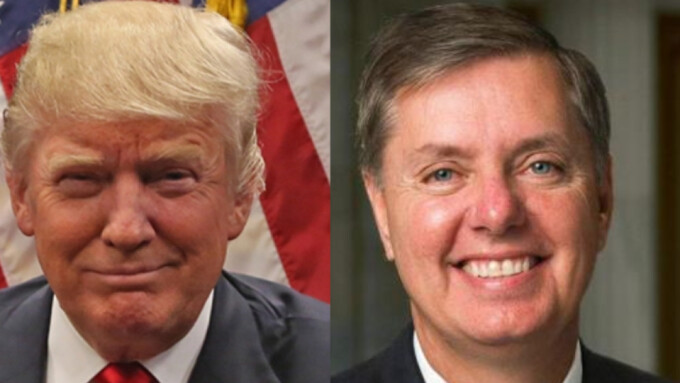WASHINGTON — President Donald Trump and Senate Republican leaders renewed their ongoing attacks on Section 230 yesterday, once again making the so-called “First Amendment of the internet" a campaign issue.
Section 230 has ensured the legal protection of platforms from liability for third-party content since the popularization of the internet in the mid-1990s. It is also seen by legal experts as the key protection for online free speech, including all legal, consensual sexually-oriented content.
Trump — who signed a highly unusual Executive Order in May titled “'Executive Order on Preventing Online Censorship” to target Section 230 with the few tools available to the executive branch of government — decried via Twitter the legal protection of platforms.
"Why does Twitter leave phony pictures like this up, but take down Republican/Conservative pictures and statements that are true? Mitch must fight back and repeal Section 230, immediately. Stop biased Big Tech before they stop you!" Trump tweeted in response to a clearly doctored meme image of Mitch McConnell photoshopped in a Russian military uniform with the caption “Moscow Mitch.”
But Trump’s anger at Section 230 is limited by his inability to repeal it or amend it, which, unfortunately for him, is a power reserved to Congress.
Later in the day Republican Senators Roger Wicker (Mississippi), Lindsey Graham (South Carolina) and Marsha Blackburn (Tennessee) introduced yet another bill to curtail Section 230 protections
'Objective Reasonable Belief'
Named the Online Freedom and Viewpoint Diversity Act, the bill is one of a number of proposals being considered by the current Congress to alter Section 230. Graham himself is the main sponsor of the EARN IT Act, which is making its way through the Senate, and he has spoken positively of another bill, the PACT Act, also being considered as an antidote to Section 230.
Animosity against Section 230 has become a bipartisan issue, with Democratic presidential candidate Joe Biden having gone on record about being in favor of repealing it. His running mate Kamala Harris has already shown skepticism to the absolute protections of Section 230 by crusading behind FOSTA/SESTA legislation in 2016-2018, which dealt the biggest blow to its provisions by eliminating the liability protection in the case of suspected “human trafficking.”
Like EARN IT, the Republican-driven bill introduced yesterday makes protection from liability contingent on content moderation being on an "objectively reasonable belief" standard.
The Republican Senators object to Section 230’s definition of "otherwise objectionable" content, which they (and Trump) consider to be an excuse for platforms to target the spectrum of the U.S. political and social right (from conservatives to the far right) for content removal. The bill attempts to narrow that vague definition to specific terms like "promoting terrorism," "unlawful" content, and content that promotes "self-harm," which the Republican Senators call "objective." The bill also expands the definition of "information content provider.”
"For too long, social media platforms have hidden behind Section 230 protections to censor content that deviates from their beliefs," Senator Wicker stated when the bill was introduced.
A Unique Ecosystem
But Section 230 expert Jess Miers told XBIZ that she questions the politicians' priorities during this campaign year.
"Content moderation is already an immensely difficult challenge for websites that host user-generated content," Miers explained. "As proposed, this bill would only ratchet up that difficulty, putting websites in a tight spot when it comes to moderating content, especially content at the border of 'lawful but awful.'"
The bill, Miers continued, "attempts to neatly confine permissible moderation to content categories such as 'promoting self-harm,' 'promoting terrorism,' or 'unlawful.' However, anyone that understands the unique ecosystem that is the online world knows that content doesn't always fit into one of those boxes."
Miers provided the example of Nextdoor, "the geo-fenced social media service for engaging with others in your neighborhood, which just recently created a policy that would silo conversations about local and national politics from the main social feed."
"Conversations about local and national politics might not fit under any of the categories under Section 230(c)(2) such as 'obscene, lewd, lascivious, filthy, excessively violent, harassing, promoting self-harm, promoting terrorism, or unlawful.' Still, Nextdoor has importantly decided that those conversations don't fit the service's goals. That moderation decision is their right as a private company."
The proposed bill, Miers said, "would not only restrict Nextdoor from making those innovative moderation decisions, but it would also open Nextdoor up to immense legal liability for such decisions."
"We want websites to be able to freely moderate their services the way they see fit," Miers told XBIZ. "That was the entire point of Section 230. The alternative guarantees an overall worse online environment for everyone."







